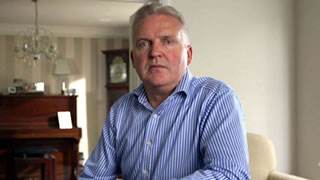'How to Die': The BBC's glorification of assisted suicide

BBC Two this week aired How to Die: Simon’s Choice, a documentary chronicling businessman Simon Binner’s decision to kill himself because of his advancing Motor Neurone Disease (MND).
This is the second time in five years that the BBC has aired a documentary on an individual committing assisted suicide.
When the documentary was announced, Andrea Williams, of Christian Concern, commented:
"As a broadcaster that claims to be neutral, the BBC should be giving more than token representation to those on the side of life. Instead, it is promoting a liberal view of assisted suicide under the guise of compassion."
Fears of helplessness
Mr Binner was diagnosed with the aggressive form of MND in January 2015. Doctors thought he could potentially live until 2017 or 2018.
Rather than opt for palliative care, as do most suffers from MND, Mr Binner planned many months in advance to travel to Switzerland to kill himself.
It is currently illegal to assist an individual to kill themselves in the UK.
Mr Binner, who also had been working with the British Humanist Association (BHA) on a legal case challenging assisted suicide law in the UK, allowed himself to be filmed over the course of several months last year, prior to his death.
The documentary-quality film footage begins months before Mr Binner kills himself and painstakingly records his decline, majoring on his fears of becoming helpless and of being unable to communicate.
His friends and family tell how he has always been the life of the party and question how he will cope when he can no longer speak or write.
His sister says: "What is Simon going to be when he can’t communicate… I wouldn’t like him to get to that stage, and think: 'Oh no, now I’m hating everything, but I’m sort of trapped.'"
Mr Binner’s wife Debbie expresses her opposition to his assisted suicide, saying she doesn't really believe he wishes to do it. And for a time, Mr Binner says he is reconsidering.
But when Mr Binner attempts to hang himself in their home, Mrs Binner writes to the doctor with whom they have been communicating in Switzerland to bring the date for Mr Binner’s death forward to 19 October.
Mr Binner, his wife, sister and a couple of others travel to Basel, where they are filmed enjoying a final dinner together.
Dr Erika Preisig is shown preparing the solution for Mr Binner’s lethal injection. Mr Binner is asked a few final questions and told how to introduce the lethal solution into his body. His wife holds his hand and he breathes heavily. The shot ends just before he dies.
Afterward, Mrs Binner describes her anger, shock and self-doubt, but suggests that ultimately Simon’s choice to kill himself was for the best, because that was what he wanted.
Protecting the vulnerable
Both Dignity in Dying and the BHA have used the documentary as an opportunity to push for a more liberal law on assisted suicide in Britain.
Many others have criticised the documentary, however, for presenting assisted suicide in such a sympathetic light.
Andrea Williams pointed out that Simon’s Choice suggests that life is not worth living if a person cannot communicate with others, or needs others to care for them intensively.
She said: "The implication of the documentary is that many elderly and disabled people are no more than ‘wasted space’, when nothing could be further from the truth!
"We must oppose this and instead affirm the value of all human life as created in God’s image.
"The current law protects vulnerable people, and must be upheld in the face of ongoing attempts to liberalise it.
"It is interesting that the BBC did not choose to contrast Mr Binner’s story with that of a person who chose palliative care over suicide."
The Christian Legal Centre is currently supporting Nikki and Merv Kenward as they attempt to hold the Director of Public Prosecutions to account for liberalising the prosecution policy on assisted suicide.
Worthwhile lives
Professor Ammar Al-Chalabi, Professor of Neurology and Complex Disease Genetics at Kings, said that less than 1% of MND sufferers the hospital sees choose to kill themselves, with most opting for palliative care.
Andrea Williams also said that the programme fails to value the lives of people with disabilities and degenerative conditions.
She pointed to Christian Nick Vujicic, who was born with no arms or legs, but has dedicated his life to bringing the message of true life in Jesus to the world.
Andrea added: "Christians must continue to confront and challenge our culture of death, countering the despair with the message of hope found in Christ."
'Glorifying suicide'
The BBC’s neutrality on the fraught issue of assisted suicide has been called into question in the past.
Speaking to BBC Radio 4 after the documentary on Peter Smedley (also a MND sufferer) aired in 2011, Bishop Michael Nazir-Ali said:
"I thought that the BBC had passed up an opportunity for a fair and balanced discussion. This was a biased contribution.
"It glorified suicide and indeed assisted suicide."
He also told the Telegraph: "Life is a gift and it has infinite value and we are not competent to take it, we do not have the right to take it, except perhaps in the most extreme circumstances of protecting the weak."
Related News:
Disability campaigners to appeal High Court ruling on DPP's assisted suicide policy
BBC flooded with complaints over Choosing to Die documentary (Telegraph)
Sir Terry Pratchett suicide film prompts 'bias' claims (BBC)
Nick Vujicic: Life without Limbs
